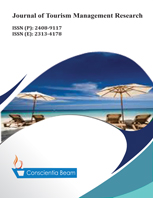Can Sustainable Tourism be More Sustainable? -Lessons Learned from Albergo Diffuso in Italy and East Asia
DOI:
https://doi.org/10.18488/journal.31.2021.82.136.149Abstract
This study aims to provide sustainable management strategies for rural communities by examining characteristics of a village hotel, Albergo Diffuso (A.D.), which has evolved through developing sustainable management and adapting to different regional contexts. While A.D. is widely recognized as a sustainable development tool for rural communities utilizing historical and environmental resources, little has been studied on which characteristics make A.D. more sustainable and how it spreads out different cultural and regional regions. No clear distinction between sustainable development and sustainable tourism was found, which interrupts evaluate the sustainability of A.D. management. Therefore, this paper seeks to identify the sustainable characteristics of A.D. and how it spread out to other regional contexts based on a theoretical framework of sustainable development and sustainable tourism. By tracking historical changes in A.D. cases of Europe and Asia, we explored how A.D. has evolved through regional and cultural contexts. In addition, we set a theoretical framework to investigate appropriate concepts explaining sustainability. As a result, sustainable tourism is more appropriate to demonstrate distinctive features of sustainable management that differentiate A.D. from an ordinary hotel theoretical framework for A.D. than sustainable development. The resident-led A.D originated from East Asia can inversely supplement A.D. in Italy as residents develop and operate their socio-cultural assets as sustainable tourism resources. Therefore, developing resident-led A.D. would provide tourists with more sustainable tourism, which gives economic benefits to inhabitants and authentic experiences to tourists.

